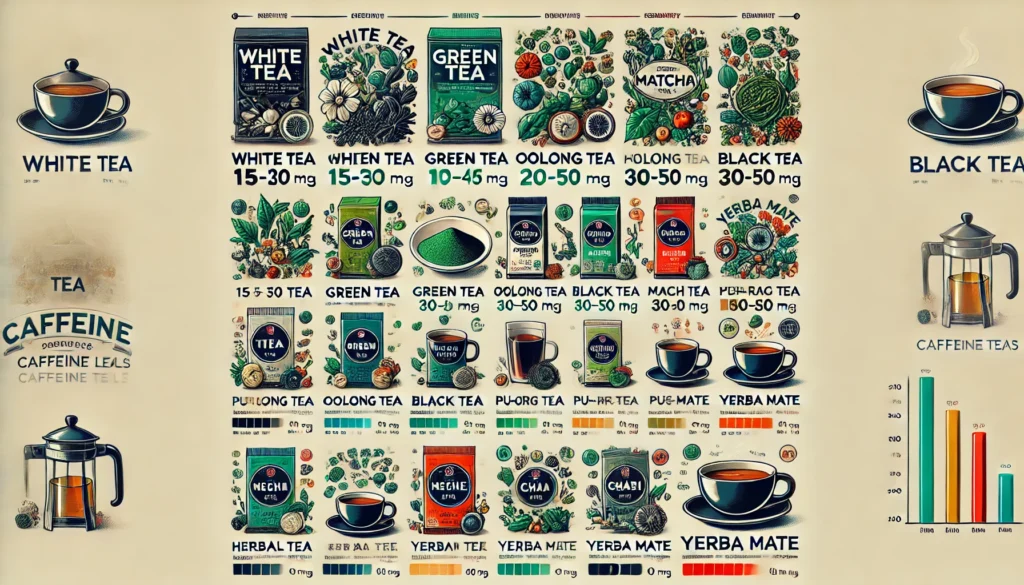Tea is one of the most popular beverages worldwide, but many people wonder about the effects of the caffeine it contains. In this article, we’ll explore how caffeine in tea affects both the mind and body, shedding light on its benefits, potential risks, and best practices for enjoying tea healthily.
What is Caffeine?
Caffeine is a natural stimulant found in various plants, including tea leaves. It acts on the central nervous system, helping to increase alertness and reduce fatigue. When consumed, caffeine quickly enters the bloodstream and travels to the brain, where it blocks adenosine – a neurotransmitter responsible for making you feel tired.
Caffeine Content in Different Types of Tea
Not all teas have the same caffeine content. Here’s a breakdown:
- Black Tea: The most caffeinated, with about 40-70 mg of caffeine per 8 oz cup.
- Green Tea: Contains 20-45 mg of caffeine per cup, making it milder than black tea.
- White Tea: Has the least caffeine among the common types, with 15-30 mg per cup.
- Oolong Tea: Falls between black and green tea, with 30-50 mg of caffeine per cup.

How Caffeine in Tea Differs from Coffee
Although both tea and coffee contain caffeine, they affect the body differently. Tea’s caffeine is released more slowly due to the presence of L-theanine, an amino acid that helps modulate caffeine’s effects, providing a steadier and more prolonged sense of alertness.
The Impact of Caffeine on the Brain
Caffeine’s primary effect on the brain is to block adenosine receptors, reducing drowsiness and promoting alertness. It stimulates the release of dopamine and norepinephrine, which improve mood, concentration, and reaction time. This makes tea an excellent choice for enhancing mental performance.
Caffeine’s Effect on the Body
Caffeine doesn’t just impact the brain; it also influences various bodily functions:
- Metabolism: Caffeine boosts metabolism by up to 10%, aiding in fat oxidation.
- Physical Performance: It enhances physical performance by increasing adrenaline levels.
- Heart Health: Studies suggest moderate caffeine intake may support heart health by improving blood vessel function.
The Health Benefits of Caffeine in Tea
- Boosts Cognitive Function: Caffeine, combined with L-theanine, enhances mental clarity, focus, and learning abilities.
- Antioxidant Properties: Tea is rich in antioxidants that combat free radicals and protect cells from damage.
- Enhances Fat Burning: Caffeine in tea can boost fat burning by up to 30%, especially during exercise.
Potential Side Effects and Risks of Caffeine
While caffeine in tea offers numerous benefits, overconsumption can lead to:
- Insomnia: Caffeine blocks sleep-inducing chemicals, making it harder to fall asleep.
- Anxiety and Jitteriness: High doses of caffeine can increase anxiety levels.
- Impact on Blood Pressure: Caffeine can cause a temporary rise in blood pressure, especially in individuals sensitive to it.
Daily Caffeine Recommendations
The FDA suggests that up to 400 mg of caffeine per day is generally safe for most adults. This is equivalent to about 8 cups of green tea or 4 cups of black tea. However, individual tolerance varies, so it’s essential to monitor your intake.
Caffeine Sensitivity and Tolerance
Caffeine sensitivity refers to how your body reacts to caffeine. Factors like genetics, age, and weight can influence sensitivity. Regular consumption leads to tolerance, meaning you may need more caffeine over time to experience the same effects.
Decaffeinated Tea Options
For those who enjoy tea but want to avoid caffeine, decaffeinated options are available. The decaffeination process removes most caffeine, retaining tea’s flavor and antioxidants.
Caffeine and Hydration
Contrary to popular belief, tea doesn’t dehydrate you. Its diuretic effect is mild, and the water content in tea contributes to your daily hydration needs.
Caffeine and Mental Health
Moderate caffeine intake may improve mood and reduce the risk of depression. However, excessive caffeine can exacerbate anxiety and stress levels.
Best Practices for Consuming Caffeine in Tea
- When to Drink Tea: It’s best to enjoy tea in the morning or early afternoon.
- Avoid Overconsumption: Limit intake to 3-4 cups per day to avoid side effects.